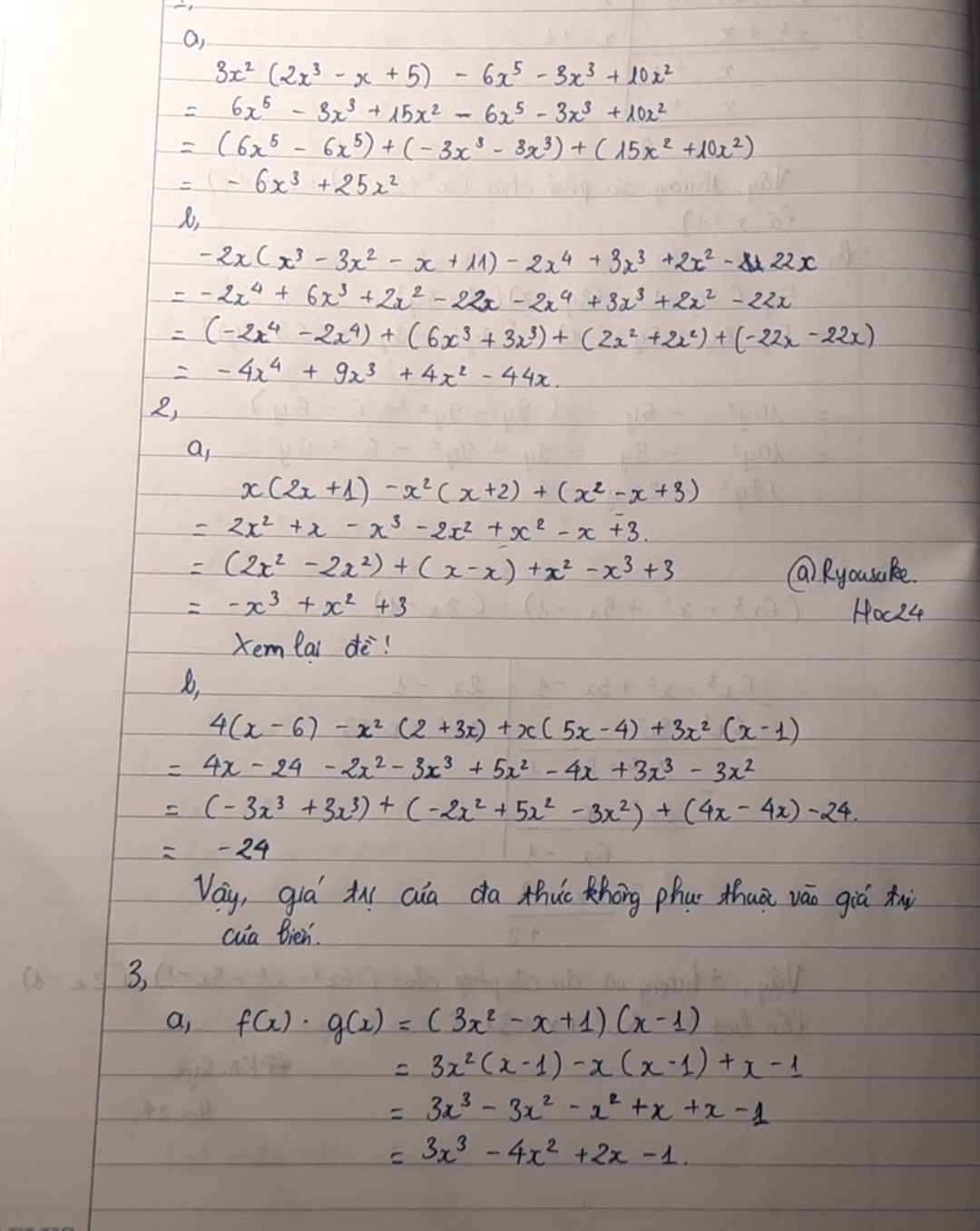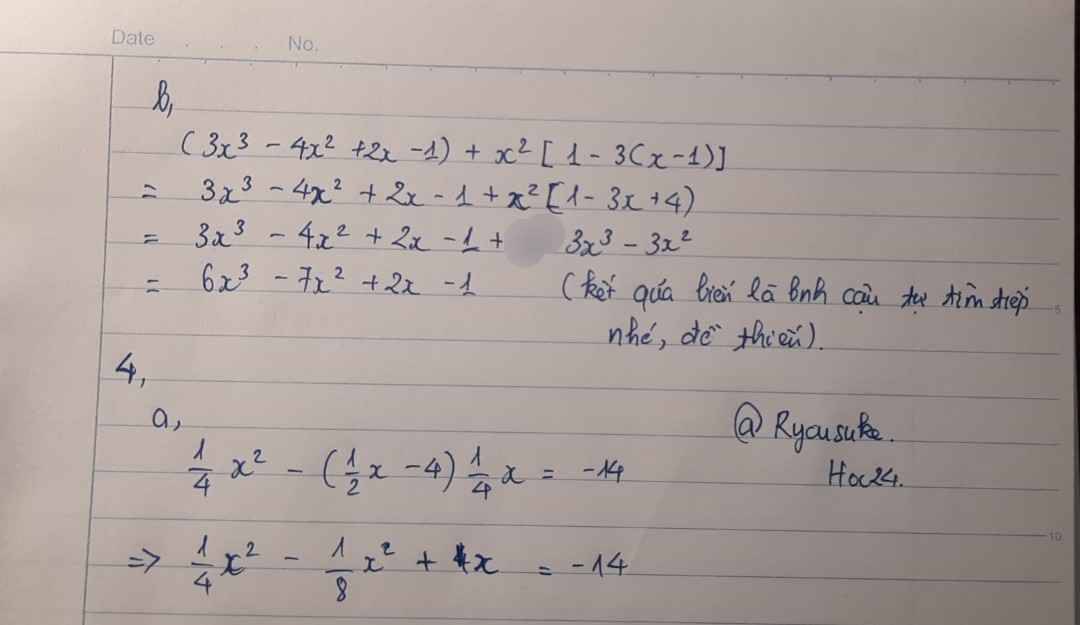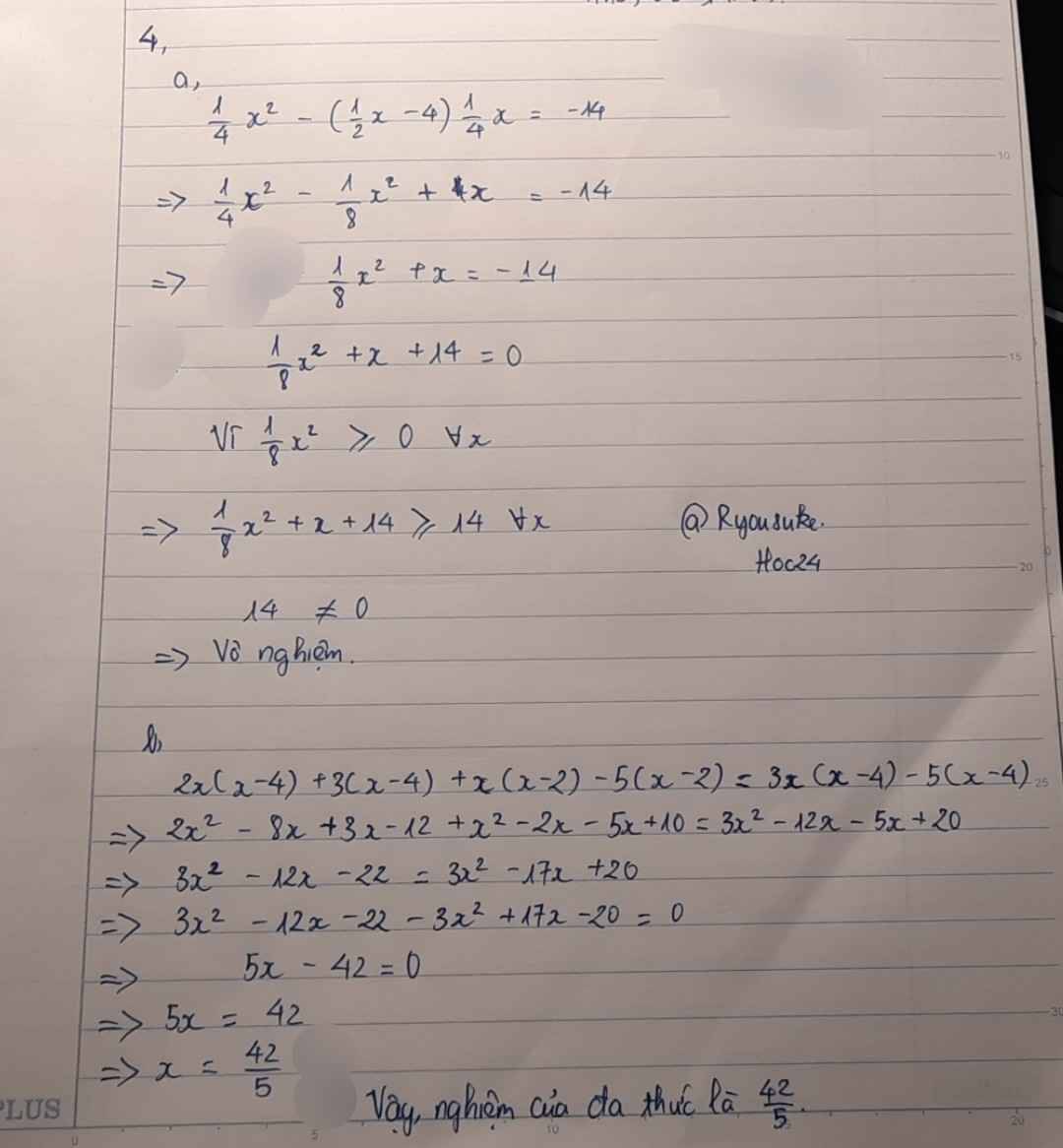chứng minh:
(x-1)3-(x+2)(x2-2x+4)=3(1-x2)
chứng minh:
(x-1)3-(x+2)(x2-2x+4)=3(1-x)
\(\left(x-1\right)^3-\left(x+2\right)\left(x^2-2x+4\right)=3\left(1-x\right)\)
\(\Leftrightarrow x^3-3x^2+3x-1-x^3-8=3-3x\)
\(\Leftrightarrow3x^2-6x+12=0\)
\(\Leftrightarrow x^2-2x+4=0\)
\(\Leftrightarrow\left(x-1\right)^2+3=0\left(VLý.do.\left(x-1\right)^2+3\ge3>0\right)\)
Vậy \(S=\varnothing\)
Chứng minh rằng giá trị của biểu thức sau không phụ thuộc vào x :
a) A=(x+6)2+2(x-5)2-(x+2)2-2(x-3)2
b) B=(x-2)(x2+2x+4)-(x+2)(x2-2x+4)
c) C=x4+2x2-(x2-2x+3)(x2+2x+3)
Lời giải:
a.
$A=(x+6)^2-(x+2)^2+2[(x-5)^2-(x-3)^2]$
$=(x+6-x-2)(x+6+x+2)+2[(x-5-x+3)(x-5+x-3)]$
$=4(2x+8)+2(-2)(2x-8)$
$=4(2x+8)-4(2x-8)=4[(2x+8)-(2x-8)]=4.16=64$ không phụ thuộc vào $x$
b.
$B=(x^3-2^3)-(x^3+2^3)=-16$ không phụ thuộc vào $x$
c.
$C=x^4+2x^2-[(x^2+3)^2-(2x)^2]$
$=x^4+2x^2-(x^4+6x^2-4x^2)$
$=x^4+2x^2-(x^4+2x^2)=0$ không phụ thuộc vào $x$
a) Ta có: \(A=\left(x+6\right)^2+2\left(x-5\right)^2-\left(x+2\right)^2-2\left(x-3\right)^2\)
\(=x^2+12x+36+2\left(x^2-10x+25\right)-\left(x^2+4x+4\right)-2\left(x^2-6x+9\right)\)
\(=x^2+12x+36+2x^2-20x+50-x^2-4x-4-2x^2+12x-18\)
\(=34\)
b) Ta có: \(B=\left(x-2\right)\left(x^2+2x+4\right)-\left(x+2\right)\left(x^2-2x+4\right)\)
\(=x^3-8-x^3-8\)
=-16
c) Ta có: \(C=x^4+2x^2-\left(x^2-2x+3\right)\left(x^2+2x+3\right)\)
\(=x^4+2x^2-\left[\left(x^2+3\right)^2-4x^2\right]\)
\(=x^4+2x^2-\left(x^4+6x^2+9\right)+4x^2\)
\(=-9\)
Bài 1: Rút gọn biểu thức sau:
a. 3x2(2x3- x+5) - 6x5-3x3+10x2
b. -2x(x3-3x2-xx+11)-2x4+3x3+2x2-22x2x
Bài 2: Chứng minh biểu thức sau không phụ thuộc vào x:
a. x(2x+1)-x2(x+2)+(x2-x+3)
b. 4(x-6)-x2(2+3x)+x(5x-4)+3x2(x-1)
Bài 3: Cho đa thức: f(x)=3x2-x+1
g(x)=x-1
a. Tính f(x).g(x)
b. Tìm x để f(x).g(x)+x2[1-3g(x)]=
Bài 4: Tìm x:
a. \(\dfrac{1}{4}\)x2-(\(\dfrac{1}{2}\)x-4)\(\dfrac{1}{2}\)x=-14
b. 2x(x-4)+3(x-4)+x(x-2)-5(x-2)=3x
(x-4)-5(x-4)
Các bạn giúp mik giải bt nha. Cảm ơn mn nhiêu ạ.
`@` `\text {Ans}`
`\downarrow`
Gửi c!



Bài 1:
a) \(3x^2\left(2x^3-x+5\right)-6x^5-3x^3+10x^2\)
\(=6x^5-3x^3+10x^2-6x^5-3x^3+10x^2\)
\(=10x^2+10x^2\)
\(=20x^2\)
b) \(-2x\left(x^3-3x^2-x+11\right)-2x^4+3x^3+2x^2-22x\)
\(=-2x^4+6x^3+2x^2-22x-2x^4+3x^3+2x^2-22x\)
\(=-4x^4+9x^3+4x^2-44x\)
4:
a: =>1/4x^2-1/4x^2+2x=-14
=>2x=-14
=>x=-7
b: =>2x^2-8x+3x-12+x^2-2x-5x+10=3x^2-12x-5x+20
=>3x^2-12x-2=3x^2-17x+20
=>5x=22
=>x=22/5
Bài3: Chứng minh rằng giá trị của biểu thức sau không phụ thuộc vào giá trị của biến
a) x2-6x-2xy+12y
b) (3-2x)(3+2x)-(2x+3)(2x-5)+4x
c) 4(x+1)2+(2-1)2-8(x-1)(x+1)-4x
d) (3x+2)2+(2x-7)2-2(3x+2)(2x-7)-x2+36x
Bài3: Chứng minh rằng giá trị của biểu thức sau không phụ thuộc vào giá trị của biến
a) x2-6x-2xy+12y
b) (3-2x)(3+2x)-(2x+3)(2x-5)+4x
c) 4(x+1)2+(2-1)2-8(x-1)(x+1)-4x
d) (3x+2)2+(2x-7)2-2(3x+2)(2x-7)-x2+36x
\(a)x^2-6x-2xy+12y\\=(x^2-2xy)-(6x-12y)\\=x(x-2y)-6(x-2y)\\=(x-2y)(x-6)\)
Bạn xem lại đề!
\(b\Big) (3-2x)(3+2x)+(2x+3)(2x-5)+4x\\=3^2-(2x)^2+(4x^2-10x+6x-15)+4x\\=9-4x^2+4x^2-10x+6x-15+4x\\=(9-15)+(-4x^2+4x^2)+(-10x+6x+4x)\\=-6\)
*Đã sửa đề*
\(c\Big) 4(x+1)^2+(2x-1)^2-8(x-1)(x+1)-4x\\=4(x^2+2x+1)+(2x)^2-2\cdot2x\cdot1x+1^2-8(x^2-1^2)-4x\\=4x^2+8x+4+4x^2-4x+1-8x^2+8-4x\\=(4x^2+4x^2-8x^2)+(8x-4x-4x)+(4+1+8)\\=13\)
*Đã sửa đề*
\(d\big) (3x+2)^2+(2x-7)^2-2(3x+2)(2x-7)-x^2+36x\\=[(3x+2)^2-2(3x+2)(2x-7)+(2x-7)^2]-x^2+36x\\=[(3x+2)-(2x-7)]^2-x^2+36x\\=(3x+2-2x+7)^2-x^2+36x\\=(x+9)^2-x^2+36x\\=(x+9-x)(x+9+x)+36x\\=9(2x+9)+36x\\=18x+81+36x\)
Bạn xem lại đề!
\(Toru\)
\(a,\left(x-5\right)\left(2x+3\right)-2x\left(x-3\right)+x+7\)
\(=x\left(2x+3\right)-5\left(2x+3\right)-2x^2+6x+x+7\)
\(=2x^2+3x-10x-15-2x^2+6x+x+7\)
\(=\left(2x^2-2x^2\right)+\left(3x-10x+6x+x\right)+\left(-15+7\right)\)
\(=-8\)
*Cách làm: Nhân phá để bỏ dấu ngoặc, nhóm các đơn thức đồng dạng và tính.
Bài 1: Chứng minh rằng hai phân thức sau bằng nhau
a)x2+2x+1/x2+x=x+1/x
b)x-3/x=x2-4x+3/x2-x
a) Ta có: \(\dfrac{x^2+2x+1}{x^2+x}\)
\(=\dfrac{\left(x+1\right)^2}{x\left(x+1\right)}\)
\(=\dfrac{x+1}{x}\)
b) Ta có: \(\dfrac{x^2-4x+3}{x^2-x}\)
\(=\dfrac{\left(x-1\right)\left(x-3\right)}{x\left(x-1\right)}\)
\(=\dfrac{x-3}{x}\)
chúng minh giá trị biểu thức sau ko phụ thuộc vào giá trị biến
a) (x-1)(x-2)(1+x+x2)(4+2x+x2)-x6+9x3
b) (\(\dfrac{1}{3}\)+2x)(4x2-\(\dfrac{2}{3}\)x+\(\dfrac{1}{9}\))-(2x-\(\dfrac{1}{3}\))(4x2+\(\dfrac{2}{3}\)x+\(\dfrac{1}{4}\))
c) (x-1)3-(x-1)(x2+x+1)-3(1-x)x
d) (x2-y2)(x2+xy+y2)(x2-xy+y2)+y6-x6
Mọi người giúp em vs ạ
a) Ta có: \(\left(x-1\right)\left(x-2\right)\left(x^2+x+1\right)\left(x^2+2x+4\right)-x^6+9x^3\)
\(=\left(x-1\right)\left(x^2+x+1\right)\left(x-2\right)\left(x^2+2x+4\right)-x^6+9x^3\)
\(=\left(x^3-1\right)\left(x^3-8\right)-x^6+9x^3\)
\(=x^6-9x^3+8-x^6+9x^3=8\)
b) Ta có: \(\left(\dfrac{1}{3}+2x\right)\left(\dfrac{1}{9}-\dfrac{2}{3}x+4x^2\right)-\left(2x-\dfrac{1}{3}\right)\left(4x^2+\dfrac{2}{3}x+\dfrac{1}{4}\right)\)
\(=\dfrac{1}{27}+8x^3-8x^3+\dfrac{1}{27}\)
\(=\dfrac{2}{27}\)
c) Ta có: \(\left(x-1\right)^3-\left(x-1\right)\left(x^2+x+1\right)-3x\left(1-x\right)\)
\(=x^3-3x^2+3x-1-x^3+1-3x+3x^2\)
=0
d) Ta có: \(\left(x^2-y^2\right)\left(x^2+xy+y^2\right)\left(x^2-xy+y^2\right)-x^6+y^6\)
\(=\left(x-y\right)\left(x^2+xy+y^2\right)\left(x+y\right)\left(x^2-xy+y^2\right)-x^6+y^6\)
\(=\left(x^3-y^3\right)\left(x^3+y^3\right)-x^6+y^6\)
\(=x^6-y^6-x^6+y^6=0\)
Bài 1: Tính:
a) x2(x-2x3); b) (x2+1)(5-x); c) (x-2)(x2+3x-4); d) (x-2)(x-x2+4); e) (x2-1)(x2+2x); f) (2x-1)(3x+2)(3-x)
Bài 2: Tính:
a) (x-2y)2; b) (2x2+3)3; c) (x-2)(x2+2x+4); d) (2x-1)3
Bài 3: Rút gọn biểu thức:
a) (6x+1)2+(6x-1)2-2(1+6x)(6x-1); b) 3(22+1)(24+1)(28+1)(216+1); c) x(2x2-3)-x2(5x+1)+x2; d) 3x(x-2)-5x(1-x)-8(x2-3)
Bài 4: Tính nhanh:
a) 1012; b) 97.103; c) 772+232+77.46; d) 1052-52; e) A= (x-y)(x2+xy+y2)+2y3 tại x= \(\dfrac{2}{3}\) và y= \(\dfrac{1}{3}\)
Bạn chú ý đăng lẻ câu hỏi! 1/
a/ \(=x^3-2x^5\)
b/\(=5x^2+5-x^3-x\)
c/ \(=x^3+3x^2-4x-2x^2-6x+8=x^3=x^2-10x+8\)
d/ \(=x^2-x^3+4x-2x+2x^2-8=3x^2-x^3+2x-8\)
e/ \(=x^4-x^2+2x^3-2x\)
f/ \(=\left(6x^2+x-2\right)\left(3-x\right)=17x^2+5x-6-6x^3\)
a. x2(x – 2x3) b. (x2 + 1)(5 – x) c. (x – 2)(x2 + 3x – 4) d. (x – 2)(x – x2 + 4) e. (x2 – 1)(x2 + 2x) f. (2x – 1)(3x + 2)(3 – x) g. (x + 3)(x2 + 3x – 5) h. (xy – 2).(x3 – 2x – i. (5x3 – x2 + 2x – 3).(4x2 – x + 2
a: \(=x^3-2x^5\)
e: \(=x^4+2x^3-x^2-2x\)